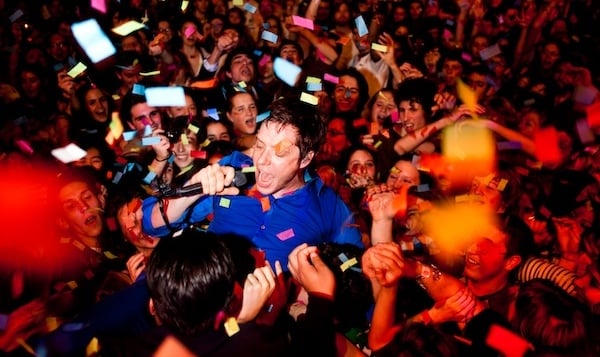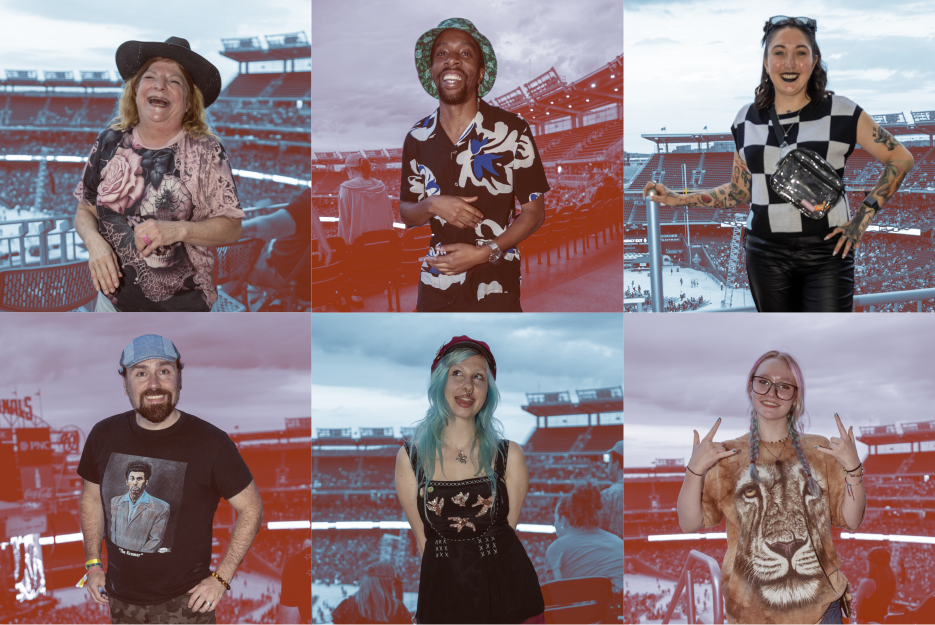Lead singer of OK Go Damian Kulash calls the music industry the "Wild West." Photograph by Nathaniel Wood
Simple is good for Damian Kulash. Primary paint colors, the humble treadmill, burnt toast, feet. All are elements featured in the rock band OK Go’s music videos, adding up to 125 million YouTube views and a Grammy for best short-form music video in 2007. Lead vocalist and District-native Kulash talks with The Washingtonian about DC audiences, digital music, and jamming at Obama’s birthday party next week.
Were there any musical influences that really grabbed you as you grew up in DC?
That’s kind of like asking, “Did you breathe any air?” I thought of myself primarily as a visual artist. I spent most of my time painting, which I’m sure actually helped lead me to music. I spent hours and hours with a Walkman on. I thought of music as sort of the social art, the thing that connected me to my peers. Visual art seemed so much more serious to me as a kid, it was such an intensely solitary act. Funny, now it’s kind of reversed. We spend a lot of our time making videos, these big, giant visual art projects that involve dozens, sometimes hundreds, of other people. Music, on the other hand, the writing of it, has become a thing that really is a solitary act for me.
You gave a shout-out to your mom at the Kennedy Center show on June 23. What role has your family played in your career?
My parents have been incredibly supportive throughout my whole life, to their credit. I think it’s rare for parents to support a kid who wants to be in a rock and roll band for a career. They never raised their eyebrows. And my sister [Trish Sie] has been very closely tied to my career, the band’s career. She’s worked on three of our videos, and always been a close collaborator. We were very tight as kids.
Do DC audiences set themselves apart in any way?
They do. The DC audiences always seem to be extra engaged. I can’t always tell whether or not it’s a DC and sort of a hometown thing. It’s not infrequent that on a short tour, DC is the closest we get to the South, and there are often a lot of people who come in from out of town. I don’t think that truly defines music shows, but I do always look forward to the DC show on a tour and have really never been let down.
You’ve written several op-eds for major newspapers about how the music industry is shifting. Do you have any insights for the music world in the next three to five years?
I think it’s going to continue to feel like the Wild West from within. I suspect that cloud services will extend. How people get paid, how musicians keep food on their tables is still something of a question mark. It’s pretty hard to dispute that things like Spotify are super attractive services. That infinite library is the goal from the technological and distribution standpoint. How that will look for musicians financially is anyone’s guess. Payments per download from cloud services are small, but they do allow for musicians to distribute and promote themselves without the aid of massive companies.
What does it mean for you to see fans talking on Twitter and Facebook and making parodies of your videos?
There’s nothing more satisfying than watching the things we’ve made go out into the world and inspire other people. It’ll seem like a broad platitude, but the era we live in is unique in that we’re all working in the same medium no matter what aesthetic starting point we’re coming from. Those are all essentially ones and zeros. None of us do not work on some level as purveyors of ones and zeros. That could sound incredibly reductive, like it’s all the same crap, but I see it the other way. Where you used to have very strict boundaries between creative genres, now there’s a big gray area between things.
Can you talk about the process of creating this new video for “All is Not Lost”?
We don’t go into these projects knowing what they’ll come out looking like. We go in with a few ideas. We were approached by Pilobolus, the dance company, who I had seen as an 11- or 12-year-old, and loved. I had a Pilobolus poster on my wall as a kid. When we got a cold call from Pilobolus, it was like having your heroes dial you up out of the blue. My sister proposed the idea of the glass table and we brought her in to help choreograph and direct. It’s the most emotionally resonant film I think we’ve made.
You’re playing at Obama’s birthday party on August 3. How did that come together?
That’s the idea. If the debt ceiling gets raised and they still have the birthday party, then yes, we’ll be there. The band started in Chicago. We have a lot of ties to Chicago. Apparently Obama’s kids are big fans, so perhaps we have them to thank for this. Frankly, I’m still sort of shocked. I can’t believe we’re on his radar. As if I needed a reason to care about the debt ceiling. The secondary reason is that we don’t want the entire global economy to crash. But the primary reason is that I want to play the gig next week.
What’s your favorite spot in DC?
It’s hard not to love the 9:30 Club or the Black Cat. Those are places that, although both have moved since I was a teenager, the originals are where I spent all my time as a kid. They feel like home to me. And it’s easy growing up in DC to take this for granted, but the Smithsonian is just amazing. As a kid you grow up thinking every place has a dozen of the world’s best museums and you can just go there for free whenever you want. It’s unbelievable.
Subscribe to Washingtonian
Follow Washingtonian on Twitter
Follow the After Hours Blog on Twitter
More>> After Hours Blog | Arts & Events | Happy Hour Finder | Calendar of Events
















